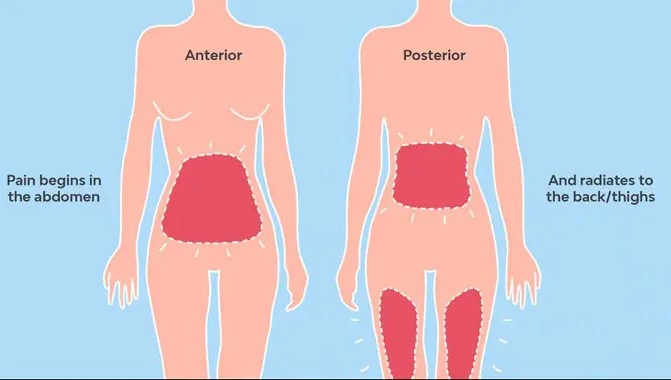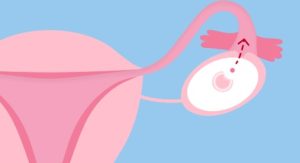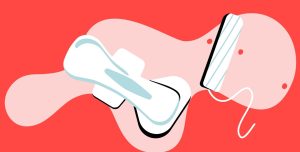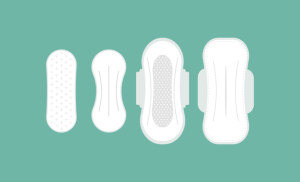Periods are tough to deal with. The mental anxiety, headaches, and acne can push you to the edge. Add back pain to the mix, and you’ll get an extremely painful mensuration week!
Understandably, anxiety, stress, and headaches result from hormonal changes during mensuration. But what about the back pain? Why do some women experience lower back pain during mensuration and what causes it?
Is it the hormones again?
Read on to find out!

How Common is Back Pain During Mensuration?
Women quite commonly experience back pain during mensuration. Some studies on the effects of mensuration on women have indicated that more than 84% of all women experience some form of pain during their period. Of these, 16% experienced severe lower back pain.
In most cases, this is not caused by an underlying condition and may directly result from mensuration cramps. It usually lasts between 1-2 days but may also affect you throughout the mensuration period.
Different women also experience varying degrees of back pain during their periods. For some, it may be mildly irritating, and others may require painkillers just to relax. If you already suffer from back pain before your period, it may only get worse during your period.
Here’re the most common pain regions for women during menstruation:

Why do You Experience Back Pain During Mensuration?
It’s normal to experience back pain as a side effect of mensuration. Lower back pain caused by mensuration can be divided into two categories:
Primary Dysmenorrhea
If you experience back pain during your first few periods, then it’s probably primary dysmenorrhea. It’s common in teens and young women and is caused by cramps. In such cases, you’ll first experience stomach cramps, and then the back pain will start.
This pain may go throughout the body and may cause pain in the lower back, legs, and knees. No need to worry, though as the pain will usually go away after a day or two.
However, if your blood flow is high, you can manage it by using Essentials extra-long pads for ultimate dry comfort.
Secondary Dysmenorrhea
This is back pain caused by the side effects of your period when you’re older. It’s also triggered by mensuration, but cramps don’t usually cause the pain. This pain may be caused by physical issues such as weak bones and other physical conditions.
In both cases, you’ll experience pain in the lower back, which is generally weaker than the upper back or shoulders.
So, why do you experience this pain? What causes the back problems and cramps?
Here are some possible causes of these back problems:
- Stomach Problems
Stomach problems are directly related to back problems, especially during your period. If you’re suffering from cramps caused by mensuration, you’ll experience stomach cramps or digestive problems, and the back pain will follow.
- Weak Bones
The main reason why some women feel back pain and others don’t is because of bone strength. If your back pain is unbearable, weaker bones could make it worse.
- Infections
Stomach infections, uterus infections, or even bone marrow infections may all cause back problems during your period. However, these are rare and won’t be the cause of recurring back pain.
Back pain during your period is usually mild and won’t affect you severely. However, if there’s severe pain affecting your lifestyle, check with a doctor to see whether there are any major underlying issues that may be causing the pain.
How to Treat Period Back Pain?
If the pain is an indirect result of your period, then it can’t be avoided. However, you can manage it more effectively with both home remedies and medical treatment. Here are some ways to manage and treat period back pain:
- Apply Regular Heat
Have you ever noticed that the pain is more in the colder months than in the summer? Applying heat to your back or bathing with warm water may help reduce the pain. You can also apply a warm bandage or deep heat spray to manage the pain.
- Try Acupuncture
It’s hard to envision that acupuncture may help reduce back pain, but medical experts have recommended it as an effective treatment, so why not give it a try?
- Sleep In the Right Position
You’ll be surprised at how simply changing your sleeping position can reduce your back pain in both the short and long term. If your sleep is disturbed due to discomfort, choose the most comfortable sanitary pads for peaceful nights.
- Eat Calcium-Rich Foods
Having stronger bones will help you manage the pain more effectively. Eat foods rich in calcium or consider taking calcium supplements for stronger bones.
Get Medical Help If the Pain Persists
Period back pain will usually go away after a day or two. However, if the symptoms become more severe, then it’s time to visit a medical professional.
Your doctor will diagnose the cause of the problem and may recommend a range of treatments. Treatment may include surgery, Endometrial resection or painkillers, and other pills.
Periods can be rough, but with the right mindset, you’ll be able to manage them more effectively.







